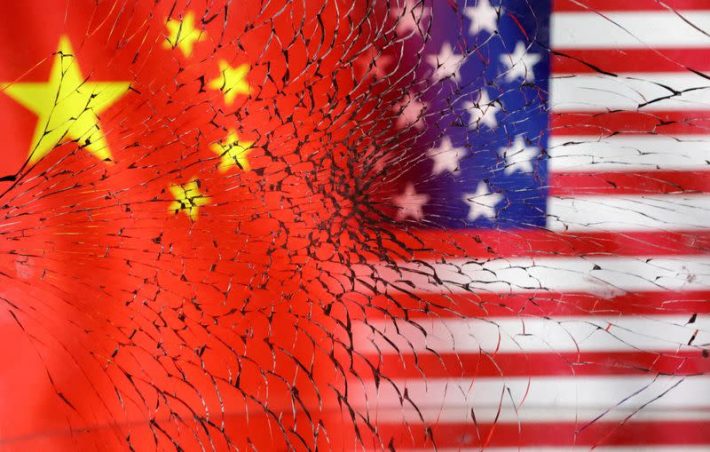The United States and China “are stuck in an unprecedented and expensive game of chicken,” according to analysts at Nomura.
In an analysis of the latest developments in the trade war spurred by tariffs imposed by US President Donald Trump last week, the Japanese investment bank said “it seems that both sides are unwilling to back down.”
Financial markets in both economies had suffered a severe hit but “the worst may be yet to come,” analysts Ting Lu, Jing Wang, Harrington Zhang and Hannah Liu said on Tuesday.
ALSO SEE: Asian Markets Simmer as China Rejects US Tariffs ‘Blackmail’
They believe the People’s Bank of China will oversee efforts to pump in large sums of state funds – via “national teams” at asset management groups and local banks – to bolster domestic stock markets.
“We expect China’s stabilization funds … supported by the PBoC, to intervene significantly in stock markets over coming weeks,” they said.
“Beijing will also very likely vow to speed up and increase fiscal spending to bolster demand, especially consumption demand.
“The PBoC, in addition to funding the national teams, could also implement high-profile RRR [the reserve requirement ratio imposed on local banks] cuts and policy rate cuts sooner than what had been planned.”
But they did not think the central bank would devalue the renminbi/yuan or allow a substantial currency depreciation to maintain domestic financial and property market stability, possibly because the US has voiced concerns about that practice.
It was impossible to estimate the impact of the trade war on China’s economy at this time, they said, because it was an “extraordinarily fluid situation.”
But they maintained their 2025 GDP growth forecast of 4.5% – below Beijing’s target of “around 5.0%”.
Bilateral tensions seen getting worse
A reason for that was because they had “already to a large extent taken into account a significant worsening of tensions between the US and China, and Beijing’s policy stimulus to counter the tariff impact.
But with US tariffs likely to dent China’s exports and largely exert disinflationary pressure, they lowered their forecasts for 2025 export growth and CPI inflation to -2.0% and 0.0%.
In 2018-19, China were able to reroute exports through third countries, such as Mexico and ASEAN nations, but the widening of the US tariffs “effectively seals off the rerouting channel” and limits China’s capacity to avoid US tariffs through intermediaries.
But they expect Beijing to step in with more spending to make up for the drop in export growth, as well as measures to boost domestic demand.
“Beijing might also step up supportive measures to clean up the mess in the property sector. As it is difficult to assess the economic damage, and perhaps as Beijing does not want to be perceived as in chaos, Beijing may stay in a wait-and-see mode and take its time to increase the budget deficit and new bond financing quota,” they said.
China may even showcase its ability to seal off seas and skies around the Taiwan Strait, as they did before the additional US 10% tariff took effect, which sparked an intense two-day military drill at the start of this month.
Policymakers in Beijing may also need to consider a large increase to basic pension payments to low-income households or raising medical insurance subsidies to bolster consumption and reduce inequality, “given the highly unequal social welfare system.”
Ties near breaking point: WSJ
Meanwhile, The Wall Street Journal said on Saturday that China wanted to negotiate with the US but found that relations are at a standstill, partly because ties between the countries’ top diplomats got off to a bad start.
In a mailout on Tuesday, the Journal’s chief China correspondent Lingling Wei explained that Chinese officials were not able to get through to Trump’s core team. “Officials who tried, including Foreign Minister Wang Yi, couldn’t get a meeting with anyone close to Trump,” she said.
One reason she gave was a remark deemed derogatory during an introductory call Wang had with Marco Rubio, the new Secretary of State, in late January. During the call, Wang told Rubio – a China critic sanctioned by Beijing in 2020 – to “hao zi wei zhi,” or “conduct yourself well.”
The remark conveyed “a sense of admonishment that one should consider the consequences of one’s actions. In other words, Wang was lecturing Rubio,” she said, adding that she was later told Wang’s remark was “a factor in why he could not get a meeting.”
On Monday, Trump threatened to escalate the dispute if China didn’t roll back its retaliatory 34% tariffs, as per a warning he gave last week. But Xi is highly unlikely to do that, Wei said, given his strongman persona. And the People’s Daily struck a defiant tone on Monday, saying in a commentary that “the sky won’t fall” because of US tariffs.
So, Trump may increase tariffs on Chinese imports by another 50%, depending on how far he wants to push things.
- Jim Pollard
NOTE: Additional details (from the WSJ note) were added to this report on April 8, 2025.
ALSO SEE:
Trump Tariff ‘Medicine’ Triggers Asian Markets Bloodbath
China Hits Back With 34% Tariffs on US Goods; SE Asia Reeling
TikTok Still Up And Running in US After Tariffs Thwart Deal
Video Gamers Angry About Impacts of Trump Tariffs – LT
India Likely to Defy Auto Lobby, Cut EV Levies to Appease Trump
India Shares Sink on US Tariffs Criticism, Xi Urges Trade ‘Tango’
China, Japan, South Korea Boost Trade Ties, as US Tariffs Loom
Xi Calls on Foreign CEOs to Help Protect Supply Chains
























